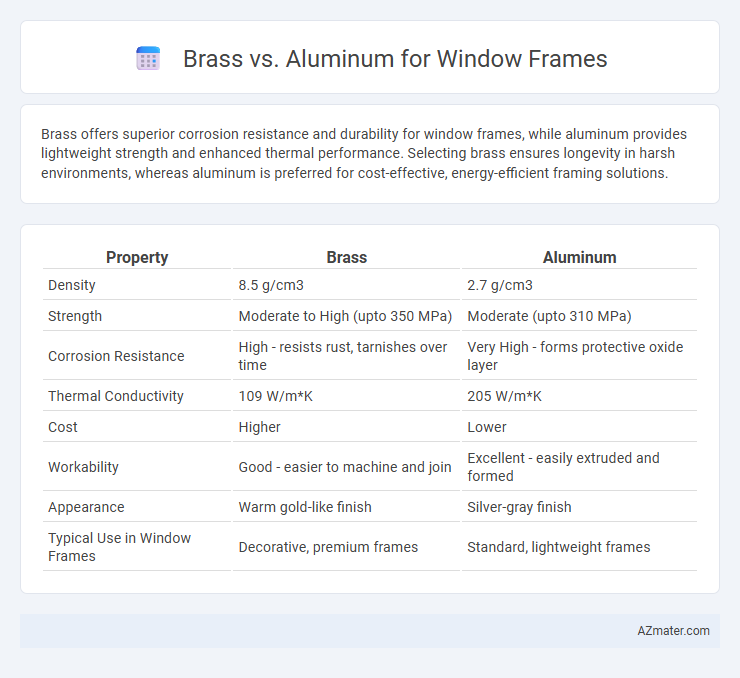Brass offers superior corrosion resistance and durability for window frames, while aluminum provides lightweight strength and enhanced thermal performance. Selecting brass ensures longevity in harsh environments, whereas aluminum is preferred for cost-effective, energy-efficient framing solutions.
Table of Comparison
| Property | Brass | Aluminum |
|---|---|---|
| Density | 8.5 g/cm3 | 2.7 g/cm3 |
| Strength | Moderate to High (upto 350 MPa) | Moderate (upto 310 MPa) |
| Corrosion Resistance | High - resists rust, tarnishes over time | Very High - forms protective oxide layer |
| Thermal Conductivity | 109 W/m*K | 205 W/m*K |
| Cost | Higher | Lower |
| Workability | Good - easier to machine and join | Excellent - easily extruded and formed |
| Appearance | Warm gold-like finish | Silver-gray finish |
| Typical Use in Window Frames | Decorative, premium frames | Standard, lightweight frames |
Introduction to Window Frame Materials
Brass and aluminum are popular materials for window frames, each offering distinct advantages in durability, aesthetics, and maintenance. Brass provides a classic, elegant appearance with excellent corrosion resistance and strength, making it suitable for traditional or high-end architectural designs. Aluminum is lightweight, cost-effective, and highly resistant to weathering, often chosen for modern constructions due to its versatility and minimal upkeep requirements.
Overview of Brass and Aluminum
Brass offers excellent corrosion resistance, high durability, and an attractive golden appearance, making it ideal for premium window frames in environments prone to moisture. Aluminum is lightweight, cost-effective, and highly resistant to rust, with exceptional strength-to-weight ratio, commonly used in modern window frames for its ease of fabrication and energy efficiency. Both metals provide distinct advantages, with brass favored for aesthetic appeal and longevity, and aluminum preferred for affordability and maintenance simplicity.
Durability Comparison: Brass vs Aluminum
Brass window frames offer superior corrosion resistance and long-lasting durability, especially in coastal or humid environments, due to their natural alloy composition of copper and zinc. Aluminum frames are lightweight and highly resistant to rust but may be prone to denting and warping under extreme weather conditions. Over time, brass maintains structural integrity better, while aluminum requires more frequent inspections and potential reinforcement to ensure longevity.
Corrosion Resistance Analysis
Brass window frames exhibit superior corrosion resistance due to their copper-zinc alloy composition, making them highly durable in both indoor and outdoor environments, especially in marine or humid conditions. Aluminum frames resist corrosion through a naturally forming oxide layer that protects against rust but can degrade in highly acidic or alkaline environments over time. When selecting materials for window frames, brass offers enhanced longevity in corrosive settings, while aluminum provides a lighter, cost-effective option with reasonable corrosion resistance.
Thermal Conductivity and Energy Efficiency
Brass window frames have a thermal conductivity of around 109 W/mK, significantly higher than aluminum's 237 W/mK, meaning aluminum transfers heat more quickly. This higher thermal conductivity results in brass providing better insulation and energy efficiency by reducing heat loss or gain through the frame. Consequently, brass frames can help lower heating and cooling costs, making them more energy-efficient compared to aluminum window frames.
Aesthetic Appeal and Design Flexibility
Brass window frames offer a classic, warm golden hue that enhances traditional and vintage design aesthetics, providing a luxurious and timeless appeal. Aluminum frames excel in design flexibility due to their lightweight nature and ease of fabrication, allowing for sleek, modern, and custom-shaped profiles that suit contemporary architecture. While brass adds ornamental richness, aluminum enables innovative styles and color finishes, making each material ideal for distinct aesthetic goals in window framing.
Maintenance Requirements for Both Metals
Brass window frames require regular polishing to prevent tarnishing and corrosion, especially in humid environments, while aluminum frames need minimal maintenance due to their natural oxidation layer that resists rust. Brass is more susceptible to weather-induced wear, necessitating periodic sealing to maintain appearance and durability. Aluminum offers superior corrosion resistance and can be easily cleaned with mild detergents, making it a low-maintenance option for window frames.
Cost and Long-Term Investment
Brass window frames typically have a higher initial cost compared to aluminum due to their premium material and intricate manufacturing process. Aluminum frames offer a more cost-effective solution upfront and require less maintenance, making them attractive for budget-conscious projects. Over the long term, brass frames provide superior durability and corrosion resistance, translating to a potentially better investment despite the initial price difference.
Environmental Impact and Sustainability
Brass window frames, composed mainly of copper and zinc, offer high durability and corrosion resistance but require significant energy for mining and processing, resulting in a larger carbon footprint compared to aluminum. Aluminum frames are highly recyclable, requiring only 5% of the energy to produce recycled aluminum versus primary production, which greatly reduces environmental impact and enhances sustainability. Both materials can be recycled, but aluminum's widespread recycling infrastructure and lower embodied energy make it a more sustainable choice for eco-conscious window framing.
Conclusion: Choosing the Right Material
Brass window frames offer superior durability, corrosion resistance, and an elegant, classic aesthetic, making them ideal for high-end, long-lasting installations. Aluminum frames provide lightweight, cost-effective, and low-maintenance solutions with excellent modern design versatility and energy efficiency. Selecting the right material depends on budget, desired style, and performance needs, with brass suited for premium durability and aluminum for affordable, practical applications.

Infographic: Brass vs Aluminum for Window Frame
 azmater.com
azmater.com